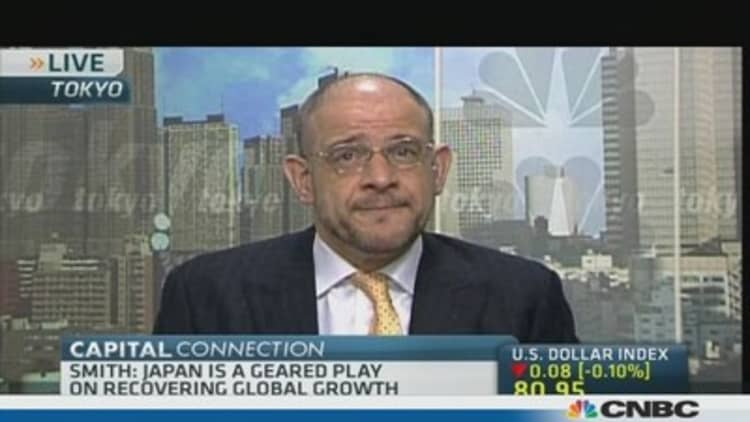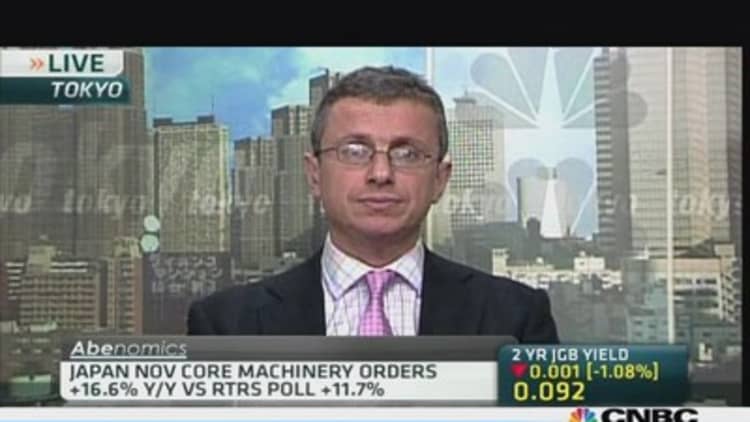
Japanese shares have gotten off to a rocky start this year, but the market's bulls remain undeterred, expecting solid gains.
After last year's near 60 percent rise, the Nikkei has fallen around 4 percent so far in January and data from Japan's Ministry of Finance show foreigners sold a net 219.1 billion yen ($2.1 billion) worth of Japanese stocks in the week ending January 11, confounding a broadly positive consensus call on the market.
(Read more: Japan Inc, isyour 'animal spirit' calling?)
"Obviously, we had an extremely good year last year," said Nicholas Smith, Japan strategist at CLSA. "So there will be a certain amount of profit taking. But there's no reason to start getting queasy on the bottom rung of the stepladder. This is the start of a recovery for Japan," he told CNBC.
"This country is probably the most highly geared to global growth," Smith said, noting global PMI data in December were the highest in 33 months.
In addition, "they're brutally competitive with a lot of operational gearing," he said, noting that many companies have cut costs so much they can break-even even if the dollar weakens to around 84 yen, compared with current levels around 104-105 yen.
Others are also sticking with a positive view.
"We're still just starting a virtuous cycle. Sure, the yen depreciation has helped, sure the huge surge in corporate profitability was the big thing over the last 12 months," Jesper Koll, head of Japanese equity research at JPMorgan Securities told CNBC.
(Read more: Why wages in Japan are set to rise: Shinzo Abe)
"Now, putting that new cash, those new profits to work to invest in the future -- That's where the virtuous cycle is actually starting. And the good news is you've got the tightness of capacity, the tightness in the labor market, and the willingness, the great capitalization of Japanese banks -- all of that is coming together to give you a virtuous multi-year upcycle," Koll said.
Indeed, despite the strong rally last year, Societe Generale still views the market as cheap, noting shares trade at around 14.7 times 12-month forward earnings, compared with a historical average of 16.3 times.

Societe Generale also expects the yen to continue depreciating, forecasting the U.S. dollar will fetch 108 yen by the end of the year and 118 over the next 18 months, a bullish signal for equities. It expects the Nikkei to touch 18,000 by the end of the year, compared with current levels around 15,737.
(Read more: Nikkei at 25,000? Nomura thinks so)
To be sure, many analysts are concerned about how well the economy will weather the increase in the consumption tax to 8 percent from 5 percent, set for April
Despite its bullishness, Societe Generale forecasts Japan's economy will dip into a contraction in the second quarter due to the tax hike. But it expects the Bank of Japan will respond with additional quantitative easing measures, further weakening the yen and in turn boosting growth.
"The stock market ought to maintain its uptrend, and Japan could enter a virtuous circle that would enable Japanese corporates to stop deleveraging and lead Japan to escape the sluggish domestic demand and deflationary environment that has plagued it for so long," it said in a note.
(Read more: Japan's Suntory to buy US drinks group Beam)
But not everyone expects a rosy outlook.
Deutsche Bank expects the tax hike will cause the failure of Abenomics – a series of policy measures, described as "arrows," unveiled under Prime Minister Shinzo Abe to jump start the economy.
In a real-estate report, it said it expects the government's fiscal stimulus isn't large enough to offset the negative impact from the tax hike, while the rush of housing investment timed to beat the increase is likely to lead to a slower pace of money growth after the hike.
(Read more: Japan's tax hike won't hit all retailers equally)
"Monetary easing by the Bank of Japan has noticeably boosted Japan's money stock, and we believe that this has supported rising stock prices and yen depreciation," Deutsche Bank said in a note. "The resulting backlash from April will likely slow the pace of money stock growth, and we think this would break the first arrow of Abenomics."
—By CNBC.Com's Leslie Shaffer; Follow her on Twitter @LeslieShaffer1

